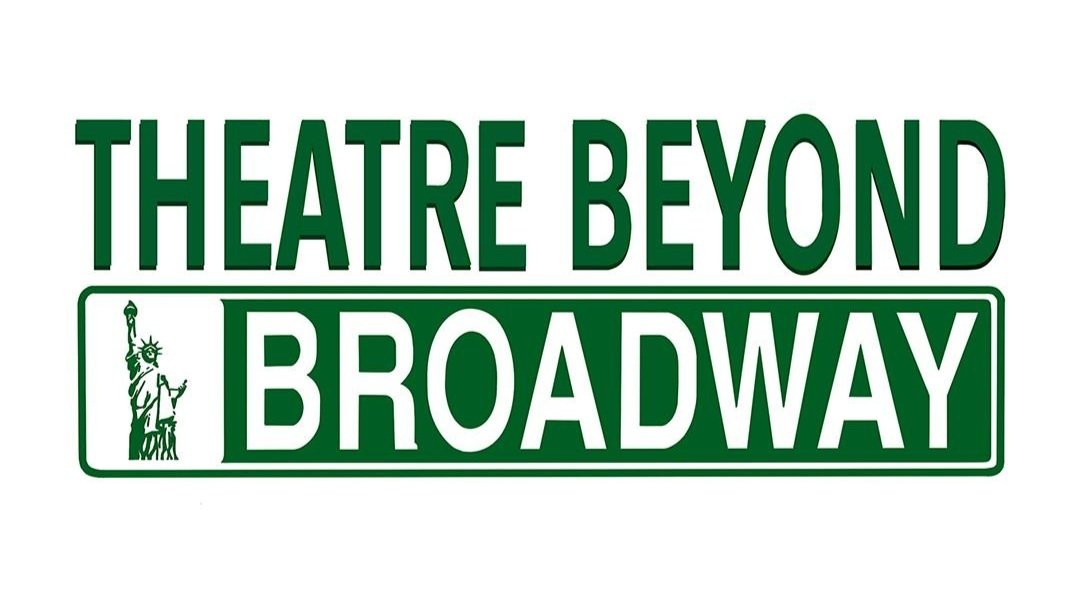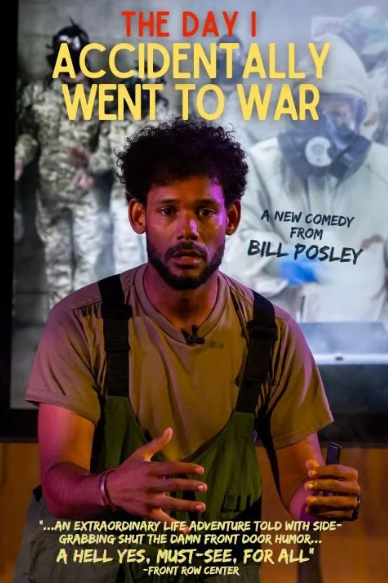The Day I Accidentally Went to War
Written by Bill Posley; Directed by Bente Engelstoft
Soho Playhouse | 15 Vandam Street, New York, NY 10013
August 6 - 30, 2025
Bill Posley’s The Day I Accidentally Went To War detonates with the force of a truth bomb—equal parts stand-up comedy, cathartic confession, and theatrical communion. In this blisteringly funny and profoundly affecting solo performance, comedian and storyteller Posley invites us not merely to witness his life’s extraordinary detour into war, but to walk beside him, combat boots on the ground, through terrain where absurdity and anguish march hand in hand.
What begins as a personal memoir quickly reveals itself as something far grander: a reflection of the American soul at war with itself. From the moment Posley strides onto the stage—radiating charisma, vulnerability, and a disarming sense of mischief—he obliterates the fourth wall with the ease of a seasoned drill sergeant turned philosopher king. Audience members are conscripted into the evening’s experience, not as passive observers but as recruits, outfitted with high-visibility vests and briefed with mock-military precision. It is a stroke of theatrical genius: a playful initiation into a world where uniformity breeds unity, and unity, as Posley suggests, is what might just save us. “This levels the playing field,” he explains—wry, but not unserious. Race, class, religion—all rendered invisible beneath a glow of shared absurdity. It’s a clever theatrical device, yes, but also a deft emotional primer: we are not simply spectators; we are now his unit.
This is no ordinary war story. It is a beautifully calibrated, genre-defying examination of identity, trauma, resilience, and—most crucially—the enduring power of empathy. Posley recounts his upbringing in a working-class Boston household, presided over by two loving but deeply troubled parents—a father wrestling with addiction and hyper-masculinity, a mother spiraling through the quicksand of gambling. From this chaotic crucible, Posley emerges not hardened, but openhearted; not bitter, but bewildered by the contradictions life hands him.
His enlistment in the Army National Guard—initially conceived as an escape hatch from familial dysfunction and a means to afford college—becomes the crucible for a far different education. It is here, amid the mud and machinery of military life, that Posley discovers both his physical limits and emotional elasticity. The images projected on screen—home videos, snapshots of a blue-collar upbringing, moments from the front lines—serve as both evidence and ghostly echo, lending haunting weight to his words.
Under the meticulous and clear-eyed direction of Bente Engelstoft, the piece moves with military precision and poetic soul, interspersing punchlines with emotional gut punches. What begins as stand-up comedy unfolds—layer by layer—into a searing meditation on identity, duty, and the cost of survival. There are laugh-out-loud moments of humiliating humanity—cramping on the way to basic training, being dubbed “Rolly Posley” for his less-than-athletic frame—but always beneath the surface is the steady, insistent beat of something more urgent: a yearning for belonging, a search for meaning in a world that often offers neither.
The most harrowing turn arrives, of course, with the events of September 11th—a day that shatters not only the nation’s innocence, but Posley’s narrative trajectory. His military graduation is canceled; instead of donning caps and celebrating survival, his unit is told, in no uncertain terms: “We’re going to war.” What follows is both surreal and sobering—an 18-year-old man, too young to order a beer, suddenly entrusted with a 50-caliber machine gun in a foreign desert, as part of a 12-man recovery team tasked with the Sisyphean work of recovering downed vehicles and dodging death at every turn.
And yet, even amid this nightmare, Posley finds humanity: in the camaraderie of his unit, in the ritual of protecting strangers, in the irony-laced gallows humor that only those under fire can truly understand. “We were AAA in the apocalypse,” he quips, with the clarity of someone who’s survived long enough to laugh about it. He naively asks about a strange hook on the front of his gun truck, only to learn it's meant to decapitate insurgent-planted wires—a response that lands with a devastating mix of dread and disbelief. “What are we doing here?” he stammers. It’s a question that echoes throughout the piece, unanswered and perhaps unanswerable.
This is a show of remarkable range. One moment you’re belly-laughing at a tale of chow hall humiliation; the next, you’re holding your breath as he describes a firefight. And yet, through it all, Posley never loses control of the narrative or the audience. He is a masterful pilot—flying low through valleys of pain, climbing toward peaks of catharsis, always aware of the human cargo he’s carrying with him.
Make no mistake: this is not simply an anti-war polemic. Nor is it a flag-waving ode to valor. It is something far more nuanced, more personal, more reflective of the maddening contradictions that define the modern American veteran. Posley does not moralize—he humanizes. He does not ask for your pity—only your attention. And in doing so, he reveals the absurd, beautiful, maddening truth of military service: that it can destroy you, build you, shape you, and confuse you—all at once.
But what truly elevates this production is not its harrowing content, nor even its comedic brilliance, but its moral clarity. The Day I Accidentally Went To War is not a tale of heroism in the traditional sense—it is a story of survival, not just of war but of the culture that refuses to reckon with it. Posley dares to ask why we send children to war and then abandon them on return. Why do we dismiss PTSD as weakness? Why do we valorize sacrifice in theory but ignore it in practice?
And yet, he offers not despair but a roadmap forward. In one of the show’s most moving moments, Posley delivers a plea for compassion with piercing sincerity. His solution isn’t legislative or grandiose—it’s profoundly human: support a veteran-owned business. Look your neighbor in the eye. Admit when you’re being, in his words, “an asshole”—because we all are, sometimes. And that’s the point: we're in this together. Whether on the battlefield or the subway platform, community is not a luxury. It’s a necessity.
In the end, this isn’t just Posley’s story. It’s ours. His journey from suburban Boston to the sands of Iraq and back again is rendered with such intimacy and universality that it becomes a mirror—reflecting a fractured, hopeful, maddeningly complex nation. A place where people still fight to be seen, to be heard, to be healed.
Posley’s play is a towering achievement of solo performance. It is hilarious, yes. And devastating. And vital. In a cultural landscape littered with empty spectacle, this is storytelling that matters. Posley doesn’t just perform—he connects. And in doing so, he reminds us of something we too often forget: the human cost of service, and the radical possibility of love.
The Day I Accidentally Went to War is not for the faint of heart. But for those willing to listen—to really listen—it is essential viewing. In an era of soundbites and oversimplifications, Bill Posley offers something rare: complexity, contradiction, and courage. He shows us what it means to be broken and rebuilt. To laugh through the tears. To march into war by accident—and come home with stories that demand to be told. This is not just a must-see. It is a must-feel. A must-think. A must-remember.
Review by Tony Marinelli.
Published by Theatre Beyond Broadway on August 25, 2025. All rights reserved.


